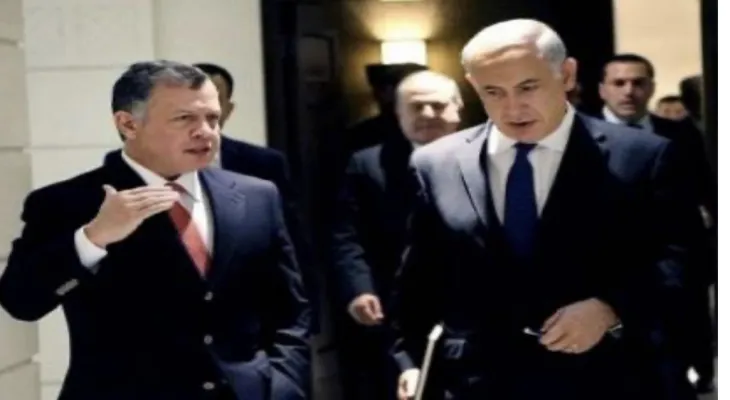Search here
Newspaper
Search here

Arab Canada News
News

Published: November 2, 2022
The political level in the Jordanian government entered a state of tension after the possible return of Jordan's most prominent adversary in Israel, Benjamin Netanyahu, to the forefront, which simply means escalation with Jordan in a deeper crisis with the so-called deep state of the entity.
Also, and more importantly, a state of confrontation and turmoil in the occupied Palestinian territories of a kind that undermines the interests and stability of the Hashemite Kingdom of Jordan.
All official and security institutions in Jordan remained on the edge of waiting and anticipation throughout Wednesday evening for the results of the Israeli elections, which shows advanced levels of interest from Jordan and the beginning of a new phase of confrontation with a government headed by Benjamin Netanyahu.
A regional meeting was held in Jordanian sovereign institutions to set a series of tactical precautionary steps, especially since the extreme right wing led by Netanyahu had previously sent an objection to what it called Jordan’s interference in the Knesset elections.
About a month ago, in that objection, which is said to have arrived in written form to Amman, Netanyahu personally warned that the deteriorating Jordanian-Israeli relations would worsen if Amman insisted, first, on interfering, and second, on placing its political bets on supporting a government or a faction and wing of Yair Lapid.
The bureaucratic and political nerves in Jordan are highly tense, and there are calls behind the scenes of the state under the title of preparing for the worst scenarios. A source close to the Jordanian Prime Minister Dr. Bisher Al-Khasawneh stated directly to "Al-Rai Al-Youm" that the government is studying its tactical duties and expects to enter an unprecedented state of confrontation with Netanyahu and his program.
According to the same source, Jordan fears that if Netanyahu sits on the throne of the entity’s government, he will start a project to liquidate the Palestinian cause and will choose to pressure Palestinians violently for their displacement. Amman also fears that Netanyahu will immediately decide to implement the plan of temporal and spatial division in occupied Arab Jerusalem, especially in Al-Aqsa Mosque, which undermines the Hashemite custodianship and returns to taking on-the-ground steps that complete his previous project during the famous Deal of the Century by annexing the West Bank.
The most dangerous thing for Jordan is that Netanyahu immediately initiates freezing the implementation of the electricity and water agreements signed with Jordanian companies, which will affect the share of Jordanian water usually committed to by the Israeli side.
The concerns are large and politically frightening at least in Amman, and the impression is strong that Netanyahu’s return under the current circumstances will pose an unprecedented challenge to normalization relations with Jordan, the Wadi Araba Agreement, and Jordan's direct security and national interests.
Jordanian institutions fear that the phenomenon of the fascist religious wing in Israel will emerge if Netanyahu consolidates power, and that racist laws will be passed, and work at a rapid pace to complete the Deal of the Century, as Jordanian decision-making circles are convinced that Netanyahu harbors grudges and hatred against the Jordanian state and has precedents with it. The matter may not stop at these limits; Jordan is more convinced of the inevitability and exacerbation of confrontation in the West Bank and Jerusalem, which adds numerous complications to the existing complications that everyone now knows.
Jordan’s calculations are very sensitive, and the diplomatic and political mobilization has been activated in the past few hours amid the impression that the Israeli political taboo is being broken, and that Netanyahu is returning surrounded by feelings of power and arrogance, with a premeditated plan to exploit the world’s preoccupation with the Ukrainian crisis and to liquidate many accounts with Jordan and Jordanians, their institutions, as well as with the Palestinian people.
Comments